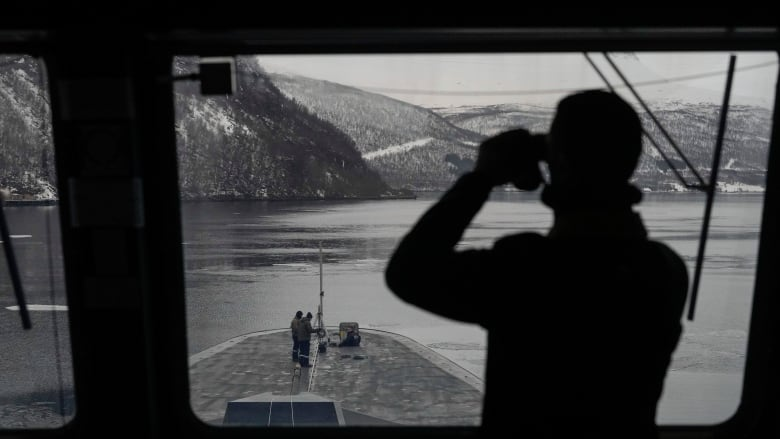Pentagon warns of potential Russian action in Arctic—including jamming GPS satellites

U.S. military concerned about growing Arctic co-operation between China and Russia
The Pentagon has released an updated Arctic strategy that warns of low-level Russian “destabilizing” activities in the Far North aimed at the United States, Canada and its allies.
The 18-page assessment, released earlier this week, also points to increased naval co-operation in the region between Moscow and Beijing and promises more allied military exercises, the deployment of new technologies and increased co-operation with NATO.
The disruption activities in the Arctic involve potential Russian jamming of global positioning system (GPS) satellites, according to the report.
“Russia continues to invest heavily in new military infrastructure and refurbishing Soviet-era installations in the Arctic,” the strategy said.
“Despite some attrition of Russia’s conventional land forces due to losses in Ukraine, its strategic, air, and maritime forces remain intact. Further, Russia has demonstrated the ability to reconstitute and reorganize its conventional ground forces, which illuminates the potential for future improved readiness and combat expertise in the Arctic.”

‘Could be practicing’ for potential conflict, says expert
A Canadian defence expert said the updated strategy is noteworthy on several levels, including the open discussion about GPS jamming, which several European countries bordering Russia — including Finland, Estonia and Poland — started complaining about last spring.
Rob Huebert, the interim director of the Centre for Military, Security and Strategic Studies at the University of Calgary, said jamming in the Arctic would represent an escalation from what’s been seen thus far and should be a major concern for Canada given commercial aviation.
GPS is an important navigation tool for airlines. The satellite-based system has replaced expensive ground devices that would transmit radio beams to guide planes toward their destination.
Last May, Russia was suspected of launching an unprecedented 63-hour-long attack on GPS signals across the Baltic region, an incident which affected hundreds of passenger jets.
Given that Russia has developed and has been using hypersonic missiles in the war in Ukraine — weapons systems that could be turned on North America in the event of a major conflict — jamming over the Far North makes sense, if it has taken place.
“They could be practicing” in the event of a conflict, Huebert said in an interview.
“All of a sudden you see a logic that is being developed to be able to blind the Americans, so then you make your move for whatever you’re doing.”

Increased Chinese-Russian collaboration
The Pentagon strategy noted how, increasingly, China and Russia are collaborating in the Arctic across multiple fronts, including on joint naval exercises.
Earlier this month, a U.S. Coast Guard cutter on routine patrol in the Bering Sea came across several Chinese warships in international waters, but within the exclusive economic zone claimed by the United States.
People’s Liberation Army navy ships and Russian navy vessels also conducted joint exercises off Alaska in 2022 and 2023.
During a recent panel discussion on the margins of the NATO Summit, a senior U.S. lawmaker noted how Washington is paying more attention to the Far North and recognizes the potential threats there.
“Let’s just face it: from a military perspective — my view — the Arctic used to be, from the Pentagon’s perspective, a strategic backwater. Nobody really paid that much attention to it,” said Republican Senator Dan Sullivan, a member of the Senate Committee on Armed Services.
Huebert said the rising interest is clearly reflected in the new Pentagon strategy, but what he finds interesting is the fact it references and appears to lean more heavily on NATO allies than in the past, possibly at Canada’s expense.
The strategy “clearly demonstrates that the Americans finally understand just how dangerous the Arctic can be” to the security interest of North America, Huebert said.
One of the things that almost all previous U.S. documents highlighted, Huebert said, was “co-operation” in the North American Aerospace Defence Command (NORAD).
“If you go to this document, they talk about the security relations with NATO. They talk about security relations with the Nordic countries. The whole mention of Canada almost is … a passing sentence.”
The U.S. strategy calls for improved surveillance of the Arctic, including the Canadian portion.

Climate change could affect militaries
The Liberal government recently introduced its own updated defence strategy which placed greater emphasis on the Far North and highlighted planned investments in a refurbished NORAD as well as the introduction of underwater surveillance sensors.
During the NATO summit, the U.S., Canada and Finland announced plans to form a partnership to build heavy icebreakers.
The Pentagon strategy nodded to the effects of climate change in the region and noted how the warmer weather will affect the ability of military forces to operate in the region.
“Variability of weather can affect warfighter and equipment performance,” the U.S. defence strategy said.
“Sustaining distributed forces and remote operating locations is even more challenging in these changing Arctic conditions. The Arctic may experience its first practically ice-free summer by 2030, and the loss of sea ice will increase the viability of Arctic maritime transit routes and access to undersea resources.”
Related stories from around the North:
Canada : Canadian military says it has tracked, stopped China surveillance in Arctic waters, The Canadian Press
Finland: Russian cyber attacks, espionage pose growing threat to Finnish national security, Yle news
Iceland: Iceland authorizes U.S. submarine service visits, Eye on the Arctic
Norway: Russian jamming disrupting GPS signals for Norwegian aviation almost daily, The Independent Barents Observer
Russia: Russia accuses US of stoking tensions in the Arctic, The Independent Barents Observer
Sweden: Swedes must mentally prepare for war, says military top brass, Radio Sweden
United States: Space takes centre stage in U.S. Department of Defense Arctic strategy, Eye on the Arctic



